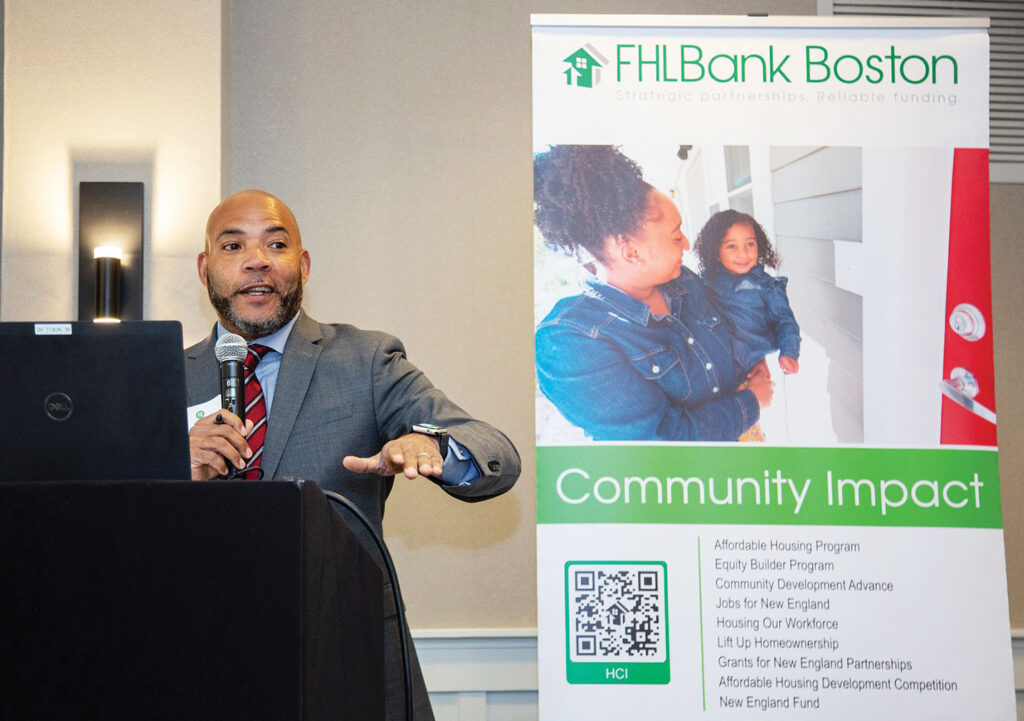FHL Bank of Boston boosts homeownership
$50,000 grants available for down payments, closing costs

Homeownership, the basic building block of American wealth, figures prominently in the nation’s equity gap, with Black and brown households lagging behind white families by 25 percent.
Following George Floyd’s horrific death at the hands of Minneapolis police in 2020, the Federal Home Loan Bank of Boston, like many financial institutions, began a careful examination of what more it could do to reduce social tensions by narrowing economic divides between communities.
Under the leadership of Kenneth A. Willis, the bank’s first vice president for housing and community investment, the FHLB launched the $2.5 million “Lift Up Homeownership” down-payment and closing-costs initiative to make it easier for families of color to own a piece of the block.
Willis had all the parts of the program assembled by the end of 2022. Grants of up to $50,000 became available earlier this year to mortgage applicants earning up to 120 percent of median income in the six New England states that the federally chartered bank serves.
Within months, the program was fully subscribed, with about 50 households now waiting to close on their new homes.
Willis, a Boston native who graduated from Madison Park Vocational Technical High School and Eastern Nazarene College before getting his first job in banking as a mortgage loan officer, said he was encouraged by the pilot program and hopes it continues.
“When George Floyd was murdered, I began thinking about what the bank could do to advance social justice,” said Willis. Research led the banker to “Special Purpose Credit Programs” authorized by the Equal Credit Opportunity Act of 1974 to target grants to benefit economically disadvantaged groups – without running afoul of recent court rulings limiting the reach of affirmative action.
“Even though Special Purpose Credit Programs have been around for several decades, they have not been widely used because there is fear and hesitancy within the banking industry about what the ramifications would be to targeting assistance even though these programs were specifically intended to increased lending to minorities and people of color,” explained Willis.
Executives of the Boston-based bank and its board members strongly backed the initiative, he added.
Timothy J. Barrett, the bank’s president and CEO, said the program aims to bring down longstanding barriers to owning a home. “Lift Up Homeownership is designed to address key obstacles that people of color face when it comes to purchasing a home, particularly insufficient cash reserves and funds for down-payments,” said Barrett.
The Federal Home Loan Bank system, created by Congress during the Great Depression to revive mortgage lending, consists of 11 privately capitalized regional banks organized as a cooperative owned by member banks.
The down-payment program in New England is the only one of its kind in the system, but Willis says banks in other regions are looking at the model for possible replication as the Boston bank considers making its own permanent.
MassHousing, an independent, quasi-public agency, has a similar program that provides up to $50,000 in down-payment assistance in 29 cities and towns in Massachusetts, including Boston, Brockton, Randolph, Worcester and Springfield. In other localities, the grants range up to $30,000.
The role of boosting Black homeownership to narrow the racial wealth gap received additional attention earlier in October with the announcement of Courtney Brunson’s appointment to head up the Boston Foundation’s latest equity initiative, the Wealth Gap Partnership.
Lee Pelton, the foundation’s president, said a focus on homeownership was the most effective way to close the divide.
Brunson, a Harvard Law graduate and former staffer for U.S. Senator Elizabeth Warren, will coordinate the work of a 30-plus member group to devise strategies to increase the supply of affordable housing, expand down-payment assistance and boost access to affordable mortgages.






